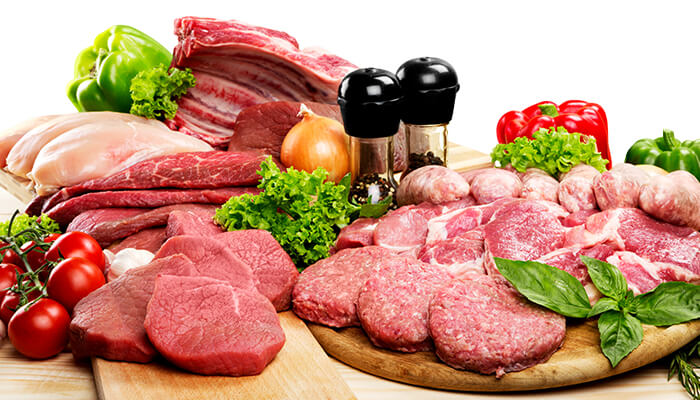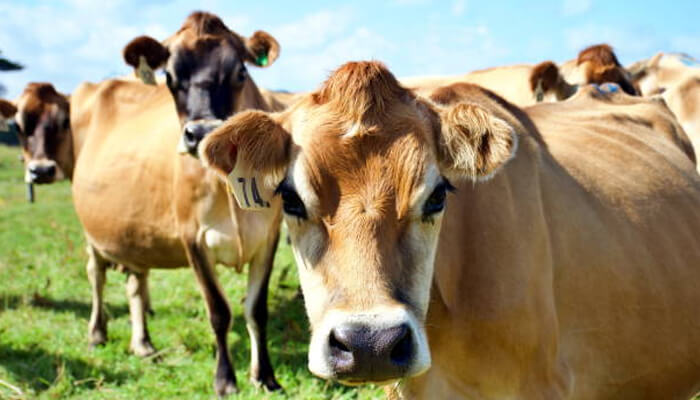There is a lot of conversation happening right now about the environmental ramifications of meat production and consumption. The meat industry creates three major environmental issues stemming from feed sourcing, the production of manure, and climate change.
For example, it takes large amounts of animal feed to raise meat. As far as manure, if it’s not being sprayed on fields, it’s being stored in open lagoons, which become prone to overflow if there’s flooding. This can release harmful substances into the surrounding environment, like pesticides and bacteria. The decomposing manure can also release methane and carbon dioxide.
There is also the issue of methane released by livestock during digestion, and then there are emissions released during the processing and transport of the animals.
Some say the answer is to stop eating meat, but this isn’t always an option or a preferred path for people. There are practices you can follow to make how you consume meat more sustainable. For example, you can learn about how your food is produced. For example, there are animal feed companies and grain companies that focus on sustainable practices throughout their supply chain.
There are other things you can do as well, in addition to learning about each step of the process, and we highlight some of the ways you can integrate more sustainability into your life while continuing to eat meat.
Choose Grass-Fed or Pasture-Raised Meats
When you’re shopping for meat, make sure that you’re carefully checking the labels and know what you’re looking for. You want to make sure you’re avoiding products that are raised in a feedlot or a concentrated animal feeding operation, or a CAFO. CAFOs have some of the worst environmental impacts in the industry.
If you’re buying meat products and they don’t specify that they’re grass-fed or pasture-raised, they very likely come from a CAFO.
If you choose cows that are grass-fed or pasture-raised, they tend to have reduced impacts on the local ecosystem compared to cattle that are conventionally raised.
Invest in a Beef Share
It used to be that it was common to buy a whole cow or hog from neighbors, and then it would be stored in a freezer, with meat lasting for most of the year. As large grocery stores and busy lifestyles became increasingly common, this practice fell out of favor, but there are reasons to revive it.
When you buy beef in bulk through a beef share, it’s more cost-effective for you, and it’s better for the animal. When the cattle are healthier, it’s also healthier to consume, and it’s better for the planet. Buying from local farmers helps reduce carbon emissions that would otherwise be required to transport the final products.
If you invest in a beef share, you can embrace the concept of nose-to-tail eating, which has become increasingly popular in the past few years. This way, nothing is going to waste, and you’re truly deriving the most value from the meat you’re eating.
Even if you don’t buy your beef in bulk or your meat in general, try to choose local options when you can. You’re not only supporting the environment but also your local economy.
Have Different Types of Meat
When you’re eating meat, the types make a difference as far as sustainability. Sheep and cows tend to contribute to greenhouse gas emissions more than animals such as pigs and chickens.
If you can keep your beef and lamb consumption down, you’re making a step in the right direction.
Chicken and pork, as well as fish, tend to be more eco-friendly options.
Shellfish can be great too. For example, mussels have a carbon footprint that’s around 20 times smaller than that of a chicken. Oysters and scallops are similar and fairly sustainable to include in your diet.
Lower Your Food Waste
One of the best things to do overall to eat more sustainably, whether it involves meat or not, is to reduce your waste. Around one-third of all produced food ends up in landfills. It costs the average family thousands of dollars a year and produces millions of tons of CO2.
Food production has the same effects on the environment regardless, but when it becomes waste, it’s thrown away with no nutrition or energy provided to you. Then it goes to a landfill, where it starts to produce methane.
There are a plenty of ways to reduce your food waste that extend to all perishable products and not just meat.
One way is to buy a freezer where you can store items for longer. Meal planning in advance before you go to the supermarket can also help, as can generally learning how to correctly store meat, fruits, and vegetables.
Integrate Plant-Based Foods
You can include meat in your diet but still be mostly plant-based in how you eat. This can be beneficial from both an environmental and also health standpoint. Your diet should be varied, and you don’t want it to be too focused on meat, regardless of your sustainability goals.
Try to include a good mix of plant-based foods in the things you eat daily. For example, beans and legumes can be a great way to add nutrient-dense protein to your diet without only relying on meat.
You might also opt to set limits on your meat consumption. Maybe you have it just once or twice a week, or you set a portion size limit when you do have it.
Skip Processed Meat
When you choose meat, try to reduce the processed items like bacon. These are more labor intensive, so more resources go into producing them, which increases their carbon footprint. By contrast, if you have pasture-raised meat from a local farmer, there’s very little going into its production.
Going vegan isn’t the only way to help the environment, and it may not be the right choice for everyone’s lifestyle, preference, or even health. If you can educate yourself on food production and make informed decisions, it’s going to be the best way to be a more sustainable consumer of meat.




